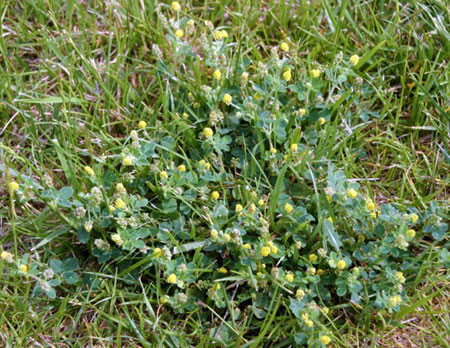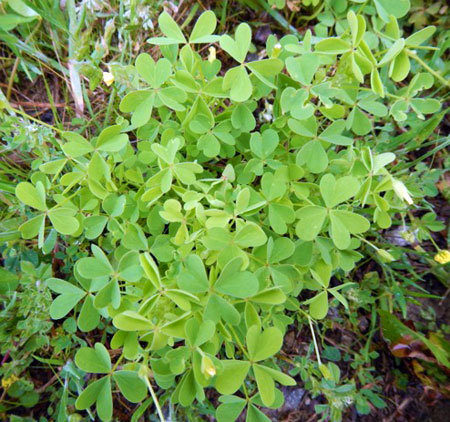Pesky broadleaf weeds flowering in turf
White clover, black medic and oxalis are all flowering in lawns and other turf now.

The trifecta of common trifoliate broadleaf weeds Black medic (Medicago lupulina), white clover (Trifolium repens) and yellow woodsorrel (Oxalis stricta) are all currently flowering and infesting turf.
Black medic and white clover
Black medic and white clover are commonly found growing on low fertility, low maintenance sites such as roadsides, boulevards, neglected home lawns and, in some cases, golf course rough. Black medic and clover are very competitive in low fertility sites because they host rhizobacteria that fix atmospheric nitrogen into plant available nitrogen.

A long-term strategy to reduce their competitiveness in turf is to ensure adequate fertility levels. At a minimum, Michigan State University Extension suggests 2 pounds N/1000 ft.2 a year split over two applications to ensure the turf is dense and competitive. Depending on the turf use and inherent soil fertility, more than 2 pounds N/1000 ft.2 may be necessary on many sites to produce a turf that is competitive with weeds. Fall broadleaf herbicide applications are the most effective for controlling these weeds; however, treatment at flowering should produce results. The most effective herbicides for controlling black medic and white clover contain the active ingredients fluroxypyr, triclopyr or quinclorac.
Yellow woodsorrel or oxalis

Yellow woodsorrel, sometimes simply referred to as oxalis, behaves as a summer annual in our climate and often infests voids left following elimination of broadleaf weeds following spring herbicide applications. In contrast to black medic and white clover, yellow woodsorrel is not a nitrogen fixer and is found in a range of conditions including fertile soils, shady, sunny and dry, so just about everywhere. Effective herbicides for post-emergence control of yellow woodsorrel include the active ingredients triclopyr and fluroxypyr.
Always read, understand and follow the label directions. Mention or exclusion of specific products does not represent an endorsement or condemnation of any product by Michigan State University.
Dr Frank's work is funded in part by MSU's AgBioResearch.



 Print
Print Email
Email
